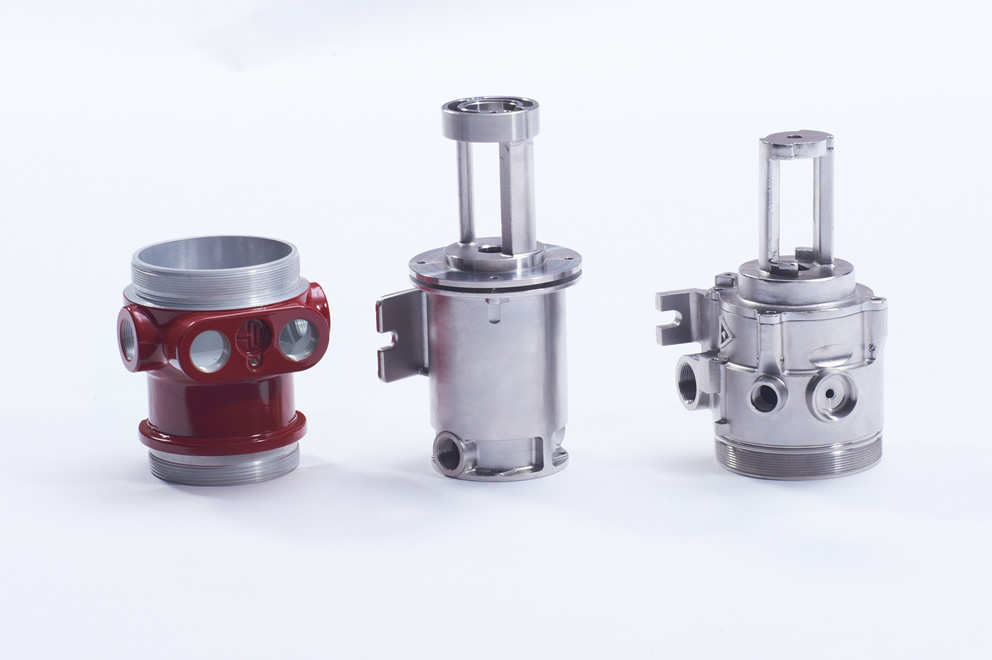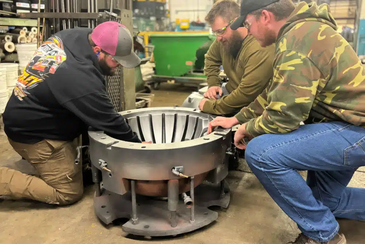The strengths of working with an expert Aluminum Casting Company
Wiki Article
Checking out the Duty of Foundry Solutions ahead of time Modern Design Solutions
Foundry solutions are necessary in shaping contemporary engineering solutions - aluminum casting. They bridge the gap between typical manufacturing techniques and the needs of contemporary sectors. With developments in automation and sustainability, shops are evolving to satisfy the needs of markets such as aerospace and auto. This makeover questions regarding the implications for materials, processes, and future technologies. What possibilities and obstacles exist ahead for factory services in this rapidly changing landscape?The Evolution of Foundry Services in Design

The combination of computer-aided layout (CAD) and simulation software program has changed the style and manufacturing processes, enabling shops to generate intricate geometries with greater accuracy. Moreover, the shift in the direction of eco-friendly techniques has caused the adoption of greener innovations and recycling initiatives within factories. As industries progressively focus on modification and fast prototyping, shop solutions have broadened their capabilities, ensuring they stay essential contributors to the design landscape. This evolution underscores the foundry's crucial role in sustaining improvements throughout various industries, including automotive, aerospace, and power.
Trick Procedures and Techniques in Modern Foundries
Modern shops use a range of crucial processes and techniques that enhance the effectiveness and top quality of steel spreading. Amongst these, sand spreading stays common because of its flexibility and cost-effectiveness. The use of sophisticated innovations, such as computer-aided layout (CAD) and computer-aided production (CAMERA), permits precise modeling and manufacturing, making certain high accuracy in component dimensions. Additionally, financial investment casting is preferred for producing complex geometries with exceptional surface area coatings.In addition, automation and robotics boost manufacturing rate and uniformity while decreasing labor expenses. Strategies like additive production are significantly integrated to generate elaborate molds and cores, thereby reducing material waste. The application of thermal evaluation aids in optimizing spreading procedures by managing and predicting solidification habits. Jointly, these processes and techniques exemplify how modern-day foundries are adapting to fulfill the needs of modern design obstacles, making sure remarkable item high quality and operational effectiveness.
The Relevance of Products Option in Shop Providers
Choosing the suitable materials is important in factory solutions, as it straight influences the mechanical residential properties, durability, and total performance of the end product. Different materials have special qualities, such as tensile strength, corrosion resistance, and thermal security, which should align with the desired application of the cast elements. Metals like aluminum and steel are usually picked for their strength-to-weight proportion, while alloys can enhance details efficiency characteristics.In addition, the selection procedure involves considering variables such as price, manufacturability, and accessibility, which can notably affect project timelines and budgets. Additionally, improvements in material scientific research enable the growth of cutting-edge composites and specialized alloys that deal with arising design obstacles. Consequently, a thorough understanding of product buildings and their implications is important for engineers and shop experts to achieve successful end results in their projects. This careful selection process eventually improves the integrity and efficiency of the end items.
Shop Providers in Aerospace and Automotive Applications
Foundry solutions play a necessary duty in the aerospace and automotive industries, where precision and efficiency are vital. These fields count heavily on the production of complicated elements that should fulfill rigorous quality standards and hold up against severe conditions. Foundries give crucial services such as casting, machining, and completing, ensuring components are lightweight yet robust, crucial for enhancing fuel effectiveness and safety.In aerospace, factory services contribute to the manufacturing of turbine blades, engine components, and architectural components, every one of which demand intricate designs and high-performance materials. Similarly, in the vehicle sector, shops provide engine blocks, chassis components, and transmission situations, concentrating on resilience and weight decrease.
Advanced foundry techniques, consisting of additive production and accuracy spreading, are significantly used to satisfy the particular requirements of these industries. By providing customized services, factory services aid drive advancement and keep affordable benefits in the fast-evolving aerospace and automobile landscapes.
Innovations Driven by Foundry Capabilities
Numerous innovations in design are fueled by the advanced capabilities of shop services. These services allow the manufacturing of complicated geometries and high-performance materials that are important for contemporary applications. Additive production, commonly recognized as 3D printing, has actually seen considerable advancements through factory techniques, enabling for the fast prototyping of complex designs. Additionally, the capacity to cast lightweight alloys has actually reinvented markets such as aerospace and automotive, resulting in improved fuel effectiveness and efficiency.Factories are progressively integrating smart technologies, such as automation and data analytics, to improve production effectiveness and top quality control. These innovations not just reduce waste but additionally make it possible for modification at range, fulfilling the details needs of customers. By leveraging innovative shop capabilities, designers can explore brand-new frontiers in item style and performance, inevitably driving progress across different markets and establishing a structure for future innovations.
Future Fads in Factory Services and Engineering Solutions
The future of factory solutions is shaped by arising patterns such as lasting manufacturing methods, which prioritize ecological responsibility. Automation and smart technologies are readied to improve effectiveness and accuracy, while enhancing personalization Precision aluminum casting and adaptability will satisfy the advancing needs of clients. As these fads advance, they will redefine the landscape of design services in the factory sector.
Lasting Production Practices
As markets increasingly prioritize environmental obligation, lasting manufacturing practices within foundry solutions are becoming necessary to modern-day design options. These practices concentrate on reducing waste, decreasing power intake, and utilizing environment-friendly materials throughout the production procedure. By carrying out techniques such as recycling scrap steel and enhancing melting processes, foundries can significantly decrease their carbon footprint. In addition, the fostering of life process evaluations allows manufacturers to review the environmental influence of their items from creation to disposal. Working together with vendors committed to sustainability additionally enhances the efficiency of these efforts. Ultimately, embracing lasting manufacturing not just lines up with worldwide environmental objectives however also cultivates technology and competitiveness in the rapidly progressing engineering landscape.Automation and Smart Technologies
While numerous sectors are accepting technological improvements, foundry solutions are experiencing a substantial improvement via automation and smart modern technologies. The assimilation of robotics and automated systems boosts production effectiveness, minimizes human error, and increases the manufacturing process. Smart innovations, such as IoT and AI, allow real-time monitoring and predictive maintenance, which optimize operational performance and reduce downtime. These innovations assist in data-driven decision-making, enabling foundries to respond quickly to market needs and boost item high quality. Additionally, automation lowers labor costs and improves office security by dealing with unsafe jobs. As shop services continue to adopt these advancements, they are poised to redefine engineering services, causing increased competition and sustainability in the production sector.Customization and Flexibility Trends
Arising fads in foundry solutions increasingly emphasize modification and flexibility to satisfy special client needs. This change reflects a wider demand for tailored design remedies that adjust to specific task demands and market criteria. Companies are purchasing sophisticated technologies, such as additive production and electronic modeling, enabling them to produce tailored parts successfully and cost-effectively. Consequently, factories are relocating far from one-size-fits-all strategies, providing customers the capability to change layouts and materials in real-time. Additionally, collaboration in between engineering groups and factory solutions is coming to be much more integrated, promoting advancement and accelerating time-to-market. This fad not only boosts item performance however likewise sustains sustainability by decreasing waste via exact production procedures.Regularly Asked Concerns
What Are the Typical Costs Connected With Foundry Solutions?
Common costs related to shop solutions include material expenses, labor charges, tools usage fees, and expenses prices - Aluminum Foundry. These expenditures can vary extensively based upon job intricacy, volume, and certain demands of the engineering service includedFor how long Does the Foundry Process Usually Take?
The shop procedure commonly takes anywhere from several weeks to a couple of months, depending on factors such as intricacy, product demands, and manufacturing quantity, which can considerably affect timelines and general job shipment.What Industries Advantage Many From Factory Providers?
Industries such as vehicle, aerospace, and building benefit significantly from foundry services. These fields depend on accuracy spreading and steel construction to produce complicated components, boosting item performance and functional efficiency in their respective applications.What Accreditations Should Factories Have?
Foundries need to have certifications such as ISO 9001 for quality administration, ISO 14001 for environmental monitoring, and details industry certifications like AS9100 for aerospace or IATF 16949 for auto, guaranteeing compliance and high quality guarantee.How Do Foundries Ensure High Quality Control in Their Processes?

Shop services are essential in shaping contemporary design solutions. As engineering techniques have actually advanced, the role of factory solutions has actually changed significantly to satisfy evolving industry demands. As markets increasingly focus on customization and rapid prototyping, foundry solutions have broadened their capacities, ensuring they stay important contributors to the design landscape. As industries significantly focus on environmental duty, lasting production practices within shop services are ending up being important to contemporary engineering solutions. In addition, cooperation between engineering teams and foundry solutions is ending up being much more incorporated, cultivating technology and accelerating time-to-market.
Report this wiki page